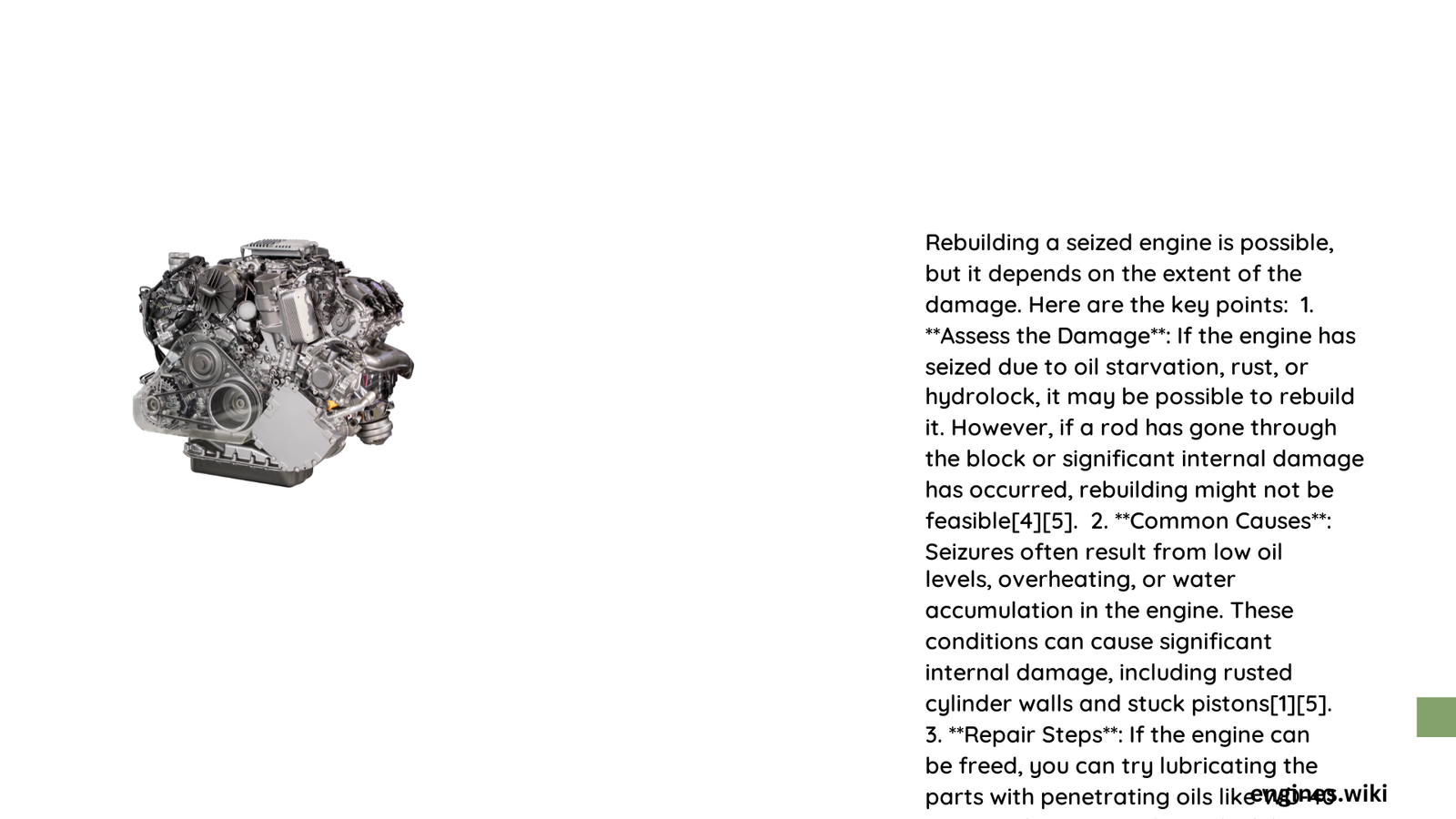A seized engine represents a critical mechanical failure where internal components lock up, preventing normal rotation. Vehicle owners facing this challenging situation often wonder about repair possibilities. Rebuilding a seized engine is technically feasible but requires extensive mechanical knowledge, specialized tools, and careful diagnostic assessment of damage extent. The process involves comprehensive disassembly, thorough inspection, precise component replacement, and meticulous reassembly to restore engine functionality.
What Causes an Engine to Seize?
Lack of Lubrication
- Oil Starvation: Insufficient engine oil leads to increased friction
- Blocked Oil Passages: Prevents proper oil circulation
- Degraded Oil Quality: Reduces lubricating effectiveness
Mechanical Failures
- Broken Connecting Rods
- Damaged Crankshaft Bearings
- Extreme Overheating
Can You Diagnose a Seized Engine?

Diagnostic Symptoms
- Complete Engine Immobility
- Grinding/Knocking Sounds
- Inability to Turn Crankshaft
- Smoke from Engine Compartment
What Tools Do You Need?
| Tool Category | Specific Tools | Estimated Cost |
|---|---|---|
| Basic Hand Tools | Socket Set, Breaker Bar | $100-$250 |
| Specialized Tools | Torque Wrench, Piston Ring Compressor | $150-$400 |
| Diagnostic Equipment | Compression Tester | $50-$150 |
Step-by-Step Engine Rebuild Process
Initial Assessment
- Perform comprehensive engine inspection
- Determine extent of internal damage
- Evaluate cost-effectiveness of rebuild
Disassembly Procedure
- Remove all external components
- Carefully document part locations
- Clean and inspect each component
- Measure wear on critical surfaces
Component Replacement
- Bearings: Always replace with new components
- Piston Rings: Ensure proper sizing
- Gaskets: Use high-quality replacements
- Cylinder Walls: Potentially require machining
Rebuild Cost Considerations
Potential Expenses
- Parts: $1,500 – $4,000
- Labor: $2,000 – $5,000 (if professionally done)
- Machine Shop Services: $500 – $1,500
Rebuild Success Probability
Factors Influencing Rebuild Success
- Initial damage extent
- Quality of replacement parts
- Precision of reassembly
- Mechanic’s expertise
Estimated Success Rates
- Minor Seizure: 70-85% recovery probability
- Moderate Damage: 40-60% recovery chance
- Severe Damage: Less than 20% successful rebuild
Professional vs. DIY Rebuild
Recommended Approach
- Professional Rebuild: Recommended for complex seizures
- DIY Rebuild: Suitable for experienced mechanics
- Hybrid Approach: Professional diagnosis, personal labor
Final Recommendations
- Conduct thorough diagnostic assessment
- Obtain professional evaluation
- Compare rebuild costs with engine replacement
- Consider vehicle’s overall condition
- Make informed financial decision
Warning Signs to Avoid Future Seizures
- Regular oil changes
- Monitor coolant levels
- Address warning lights immediately
- Perform routine maintenance
- Use high-quality lubricants
Conclusion
Rebuilding a seized engine is possible but complex. Success depends on careful diagnosis, precise execution, and realistic expectations. Professional consultation is strongly recommended for accurate assessment.
